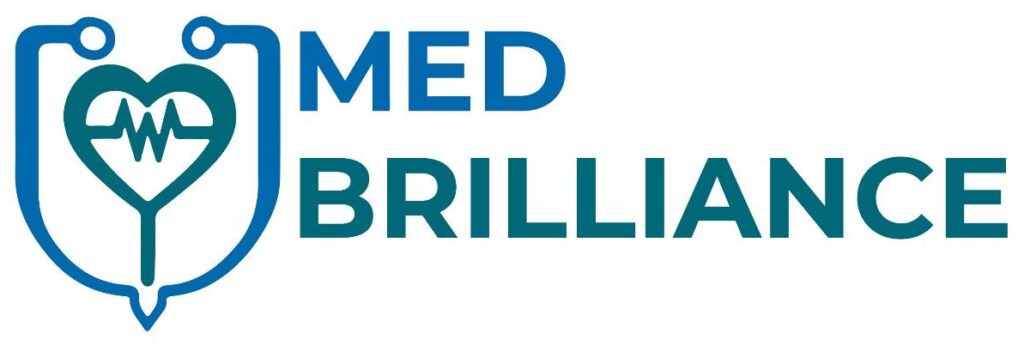An AR (Accounts Receivable) Caller in medical billing is a professional who contacts insurance companies to follow up on pending or denied claims. They make sure that timely payment for medical services is provided.
AR Callers work to reduce the aging of accounts receivable. Their job also includes correcting claim errors and updating patient data. The role is essential for maintaining cash flow in healthcare practices. MedBrilliance take this responsibility of providing the expert and professional AR Callers to handle your claim submission process and cash flow.
Key Roles and Responsibilities of an AR Caller in Medical Billing
This professional is quite important for managing the upcoming and pending payments from the insurance companies. This helps to keep the cash flow in check and balance for smooth functioning of the company.

1. Follow Up with Insurance Companies
AR callers contact insurance carriers to check claim status, resolve pending issues, and push for timely reimbursements. They follow up on both electronic and paper claims, ensuring the provider receives payment.
2. Analyze and Resolve Denied Claims
They investigate the reasons behind claim denials and initiate corrective actions. This may involve re-submitting claims with additional documentation or correcting coding errors based on payer-specific guidelines.
3. Maintain Detailed Documentation
Each call or claim follow-up is documented in detail. AR callers log conversation outcomes, payment statuses, and next steps in the billing software to maintain transparency and accountability.
Let MedBrilliance AR Callers manage your claims & secure your revenue.
Transform your provider verification with the leading credentialing teams in the USA.
4. Work on Aging Reports
AR callers review aging reports to prioritize the oldest unpaid claims. They strategically follow up on accounts that are approaching timely filing deadlines to avoid revenue loss.
5. Verify Insurance Eligibility and Coverage
Before claim submission or during follow-up, AR callers may verify patient insurance coverage to ensure eligibility and prevent claim rejections due to inactive policies or coverage issues.
6. Coordinate with Internal Billing Teams
They communicate with billing and coding teams to fix errors related to CPT codes, modifiers, or patient demographics that may cause rejections or payment delays.
7. Meet Daily Call and Productivity Targets
Medical billing companies set daily KPIs for AR callers. These include the number of claims followed up, resolution rate, and call documentation accuracy.
8. Address Patient Billing Queries
AR callers may interact with patients to explain balances, insurance denials, or coverage issues in some cases. This requires empathy and clear communication with the other people.
9. Monitor Timely Filing Limits
They track payer-specific timelines to ensure claims are submitted or re-submitted within the allowed period, avoiding denials due to late filing.
10. Identify Underpayments and Take Action
AR callers compare expected and received payments. When underpayments are detected, they escalate the issue, appeal it, or initiate payer negotiation.
11. Use Medical Billing Software Efficiently
They use tools like Epic, Kareo, eClinicalWorks, or AdvancedMD to update claim statuses, add notes, and manage patient and payer records.
Boost your provider onboarding speed while ensuring complete compliance.
Expert AR Callers. Guaranteed cash flow.
12. Handle Secondary and Tertiary Claims
AR callers manage claims that must go to secondary or tertiary payers after the primary insurance has paid, including coordinating Explanation of Benefits (EOBs).
13. Reduce Days in Accounts Receivable (AR)
Their goal is to bring down the average number of days it takes to collect payment from payers. This directly improves practice cash flow and assists in proper working of the billing company.
14. Stay Updated on Insurance Policies
They keep up with changing insurance regulations, payer-specific rules, and CMS guidelines to ensure compliance and fewer denials. This helps to calculate the correct amounts which have to be collected from the insurance companies.
15. Escalate Complex Issues
For unresolved or high-value claims, AR callers present cases to supervisors or senior billing specialists to ensure resolution without further delays.

Do’s and Don’ts of AR Callers in Medical Billing
Here are some do’s and don’ts of the AR callers in the medical billing:
Do’s
Don’ts
Follow up consistently on unpaid claims
Don’t ignore claims close to timely filing limits
Document every payer interaction in detail
Don’t assume verbal confirmations are final
Cross-check patient information before calls
Don’t use outdated or incorrect policy details
Use correct CPT/ICD codes during discussions
Don’t discuss medical history beyond claim details
Prioritize aging accounts based on payer rules
Don’t call payers without verifying claim status first
Stay calm and professional on payer calls
Don’t get frustrated with complex denials
Know payer-specific submission guidelines
Don’t generalize policies across all insurance companies
Follow HIPAA compliance at all times
Don’t share PHI on unauthorized channels
Communicate regularly with internal teams
Don’t work in isolation on complex claims
Monitor KPIs and performance metrics daily
Don’t delay updates in billing software
Boost provider onboarding speed and ensure compliance accuracy now
Discover which credentialing teams are transforming provider verification across the USA.
FAQs
1. What is the main job of an AR caller in medical billing?
An AR caller contacts insurance companies to follow up on unpaid or denied medical claims.
2. Do AR callers talk to patients directly?
Sometimes yes, especially when explaining insurance denials or confirming coverage details.
3. What skills are needed to be a good AR caller?
Strong communication, knowledge of billing codes, and insurance policies are essential skills.
4. How does an AR caller help medical practices?
AR callers improve cash flow by reducing unpaid claims and speeding up collections.
5. Is AR calling done in-house or outsourced in the USA?
Both models exist, but many clinics outsource AR calling to expert billing agencies in the USA.
Study our latest research articles on Medical Billing Audits
We strictly follow all standard medical billing protocols and you can learn more about medical billing services through Wikipedia.

